Bioethics Essay: Kantian Argument vs Doctor's Action
VerifiedAdded on 2022/08/25
|5
|1181
|15
Essay
AI Summary
This essay delves into the realm of bioethics, focusing on a case study involving a 48-year-old Jehovah's Witness patient with aplastic anemia requiring a bone marrow transplant. The patient, Jeremy, expressed his religious beliefs and informed the doctor that he would not accept the transplant if it involved blood. Despite this, the doctor proceeded with the transplant, leading to an ethical dilemma. The essay primarily discusses the Kantian argument, emphasizing the importance of acting morally and respecting patient autonomy through informed consent. It highlights the conflict between the doctor's duty to save lives and the patient's religious beliefs, concluding that the doctor's actions, while potentially medically justifiable, were ethically questionable from a Kantian perspective. The essay references relevant literature, including articles on medical ethics, religious beliefs, and Kantian philosophy to support its arguments.
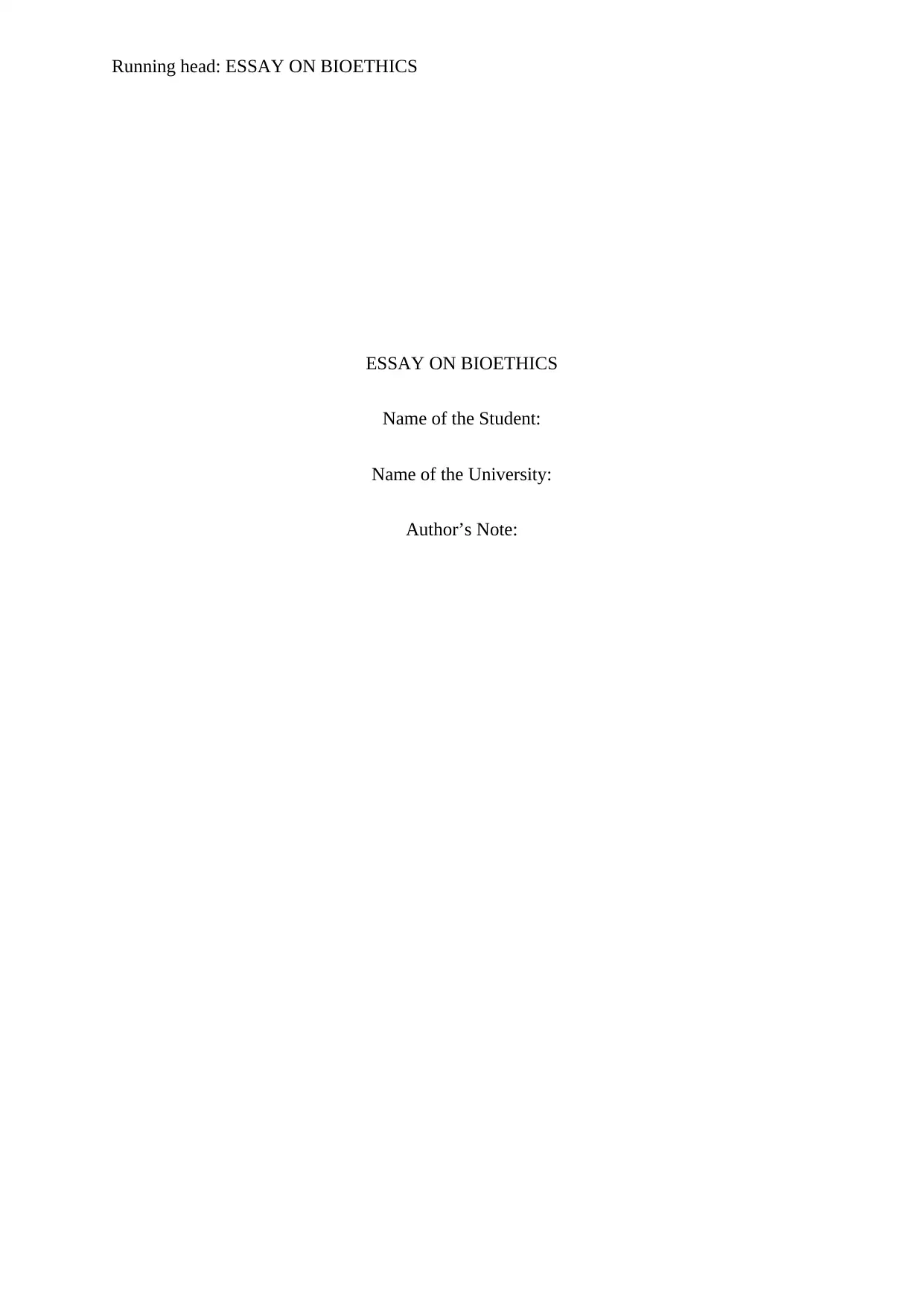
Running head: ESSAY ON BIOETHICS
ESSAY ON BIOETHICS
Name of the Student:
Name of the University:
Author’s Note:
ESSAY ON BIOETHICS
Name of the Student:
Name of the University:
Author’s Note:
Paraphrase This Document
Need a fresh take? Get an instant paraphrase of this document with our AI Paraphraser
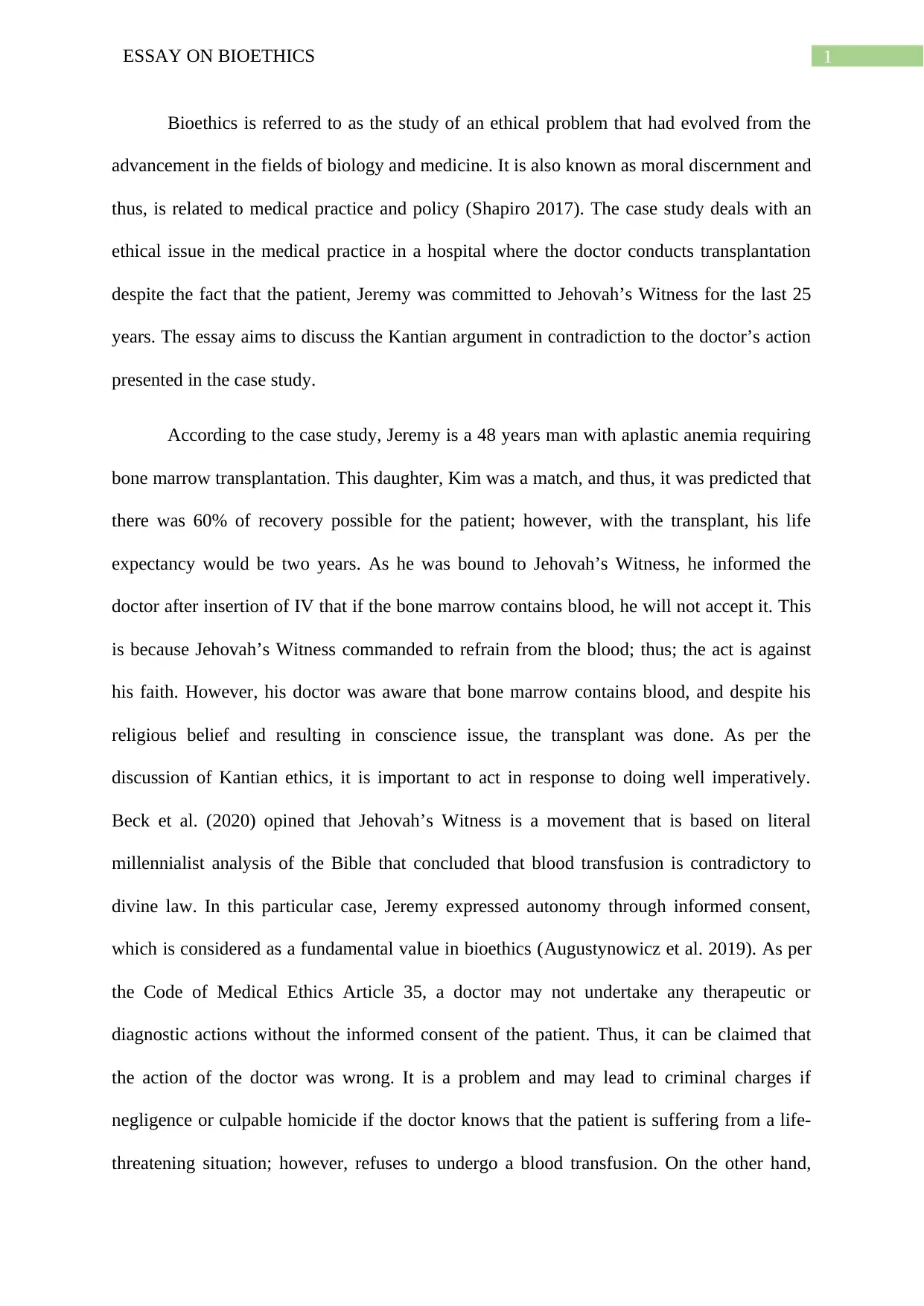
1ESSAY ON BIOETHICS
Bioethics is referred to as the study of an ethical problem that had evolved from the
advancement in the fields of biology and medicine. It is also known as moral discernment and
thus, is related to medical practice and policy (Shapiro 2017). The case study deals with an
ethical issue in the medical practice in a hospital where the doctor conducts transplantation
despite the fact that the patient, Jeremy was committed to Jehovah’s Witness for the last 25
years. The essay aims to discuss the Kantian argument in contradiction to the doctor’s action
presented in the case study.
According to the case study, Jeremy is a 48 years man with aplastic anemia requiring
bone marrow transplantation. This daughter, Kim was a match, and thus, it was predicted that
there was 60% of recovery possible for the patient; however, with the transplant, his life
expectancy would be two years. As he was bound to Jehovah’s Witness, he informed the
doctor after insertion of IV that if the bone marrow contains blood, he will not accept it. This
is because Jehovah’s Witness commanded to refrain from the blood; thus; the act is against
his faith. However, his doctor was aware that bone marrow contains blood, and despite his
religious belief and resulting in conscience issue, the transplant was done. As per the
discussion of Kantian ethics, it is important to act in response to doing well imperatively.
Beck et al. (2020) opined that Jehovah’s Witness is a movement that is based on literal
millennialist analysis of the Bible that concluded that blood transfusion is contradictory to
divine law. In this particular case, Jeremy expressed autonomy through informed consent,
which is considered as a fundamental value in bioethics (Augustynowicz et al. 2019). As per
the Code of Medical Ethics Article 35, a doctor may not undertake any therapeutic or
diagnostic actions without the informed consent of the patient. Thus, it can be claimed that
the action of the doctor was wrong. It is a problem and may lead to criminal charges if
negligence or culpable homicide if the doctor knows that the patient is suffering from a life-
threatening situation; however, refuses to undergo a blood transfusion. On the other hand,
Bioethics is referred to as the study of an ethical problem that had evolved from the
advancement in the fields of biology and medicine. It is also known as moral discernment and
thus, is related to medical practice and policy (Shapiro 2017). The case study deals with an
ethical issue in the medical practice in a hospital where the doctor conducts transplantation
despite the fact that the patient, Jeremy was committed to Jehovah’s Witness for the last 25
years. The essay aims to discuss the Kantian argument in contradiction to the doctor’s action
presented in the case study.
According to the case study, Jeremy is a 48 years man with aplastic anemia requiring
bone marrow transplantation. This daughter, Kim was a match, and thus, it was predicted that
there was 60% of recovery possible for the patient; however, with the transplant, his life
expectancy would be two years. As he was bound to Jehovah’s Witness, he informed the
doctor after insertion of IV that if the bone marrow contains blood, he will not accept it. This
is because Jehovah’s Witness commanded to refrain from the blood; thus; the act is against
his faith. However, his doctor was aware that bone marrow contains blood, and despite his
religious belief and resulting in conscience issue, the transplant was done. As per the
discussion of Kantian ethics, it is important to act in response to doing well imperatively.
Beck et al. (2020) opined that Jehovah’s Witness is a movement that is based on literal
millennialist analysis of the Bible that concluded that blood transfusion is contradictory to
divine law. In this particular case, Jeremy expressed autonomy through informed consent,
which is considered as a fundamental value in bioethics (Augustynowicz et al. 2019). As per
the Code of Medical Ethics Article 35, a doctor may not undertake any therapeutic or
diagnostic actions without the informed consent of the patient. Thus, it can be claimed that
the action of the doctor was wrong. It is a problem and may lead to criminal charges if
negligence or culpable homicide if the doctor knows that the patient is suffering from a life-
threatening situation; however, refuses to undergo a blood transfusion. On the other hand,
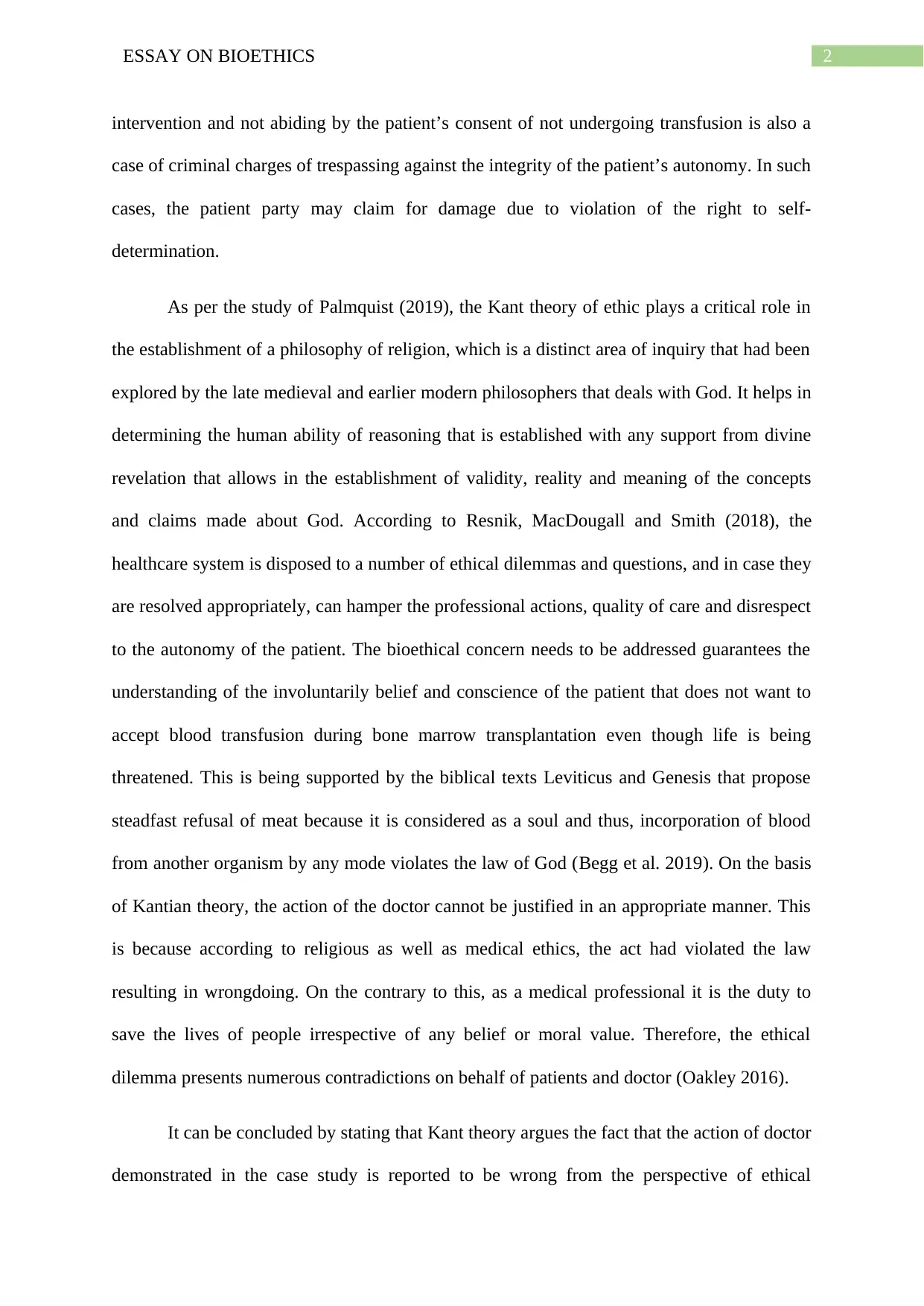
2ESSAY ON BIOETHICS
intervention and not abiding by the patient’s consent of not undergoing transfusion is also a
case of criminal charges of trespassing against the integrity of the patient’s autonomy. In such
cases, the patient party may claim for damage due to violation of the right to self-
determination.
As per the study of Palmquist (2019), the Kant theory of ethic plays a critical role in
the establishment of a philosophy of religion, which is a distinct area of inquiry that had been
explored by the late medieval and earlier modern philosophers that deals with God. It helps in
determining the human ability of reasoning that is established with any support from divine
revelation that allows in the establishment of validity, reality and meaning of the concepts
and claims made about God. According to Resnik, MacDougall and Smith (2018), the
healthcare system is disposed to a number of ethical dilemmas and questions, and in case they
are resolved appropriately, can hamper the professional actions, quality of care and disrespect
to the autonomy of the patient. The bioethical concern needs to be addressed guarantees the
understanding of the involuntarily belief and conscience of the patient that does not want to
accept blood transfusion during bone marrow transplantation even though life is being
threatened. This is being supported by the biblical texts Leviticus and Genesis that propose
steadfast refusal of meat because it is considered as a soul and thus, incorporation of blood
from another organism by any mode violates the law of God (Begg et al. 2019). On the basis
of Kantian theory, the action of the doctor cannot be justified in an appropriate manner. This
is because according to religious as well as medical ethics, the act had violated the law
resulting in wrongdoing. On the contrary to this, as a medical professional it is the duty to
save the lives of people irrespective of any belief or moral value. Therefore, the ethical
dilemma presents numerous contradictions on behalf of patients and doctor (Oakley 2016).
It can be concluded by stating that Kant theory argues the fact that the action of doctor
demonstrated in the case study is reported to be wrong from the perspective of ethical
intervention and not abiding by the patient’s consent of not undergoing transfusion is also a
case of criminal charges of trespassing against the integrity of the patient’s autonomy. In such
cases, the patient party may claim for damage due to violation of the right to self-
determination.
As per the study of Palmquist (2019), the Kant theory of ethic plays a critical role in
the establishment of a philosophy of religion, which is a distinct area of inquiry that had been
explored by the late medieval and earlier modern philosophers that deals with God. It helps in
determining the human ability of reasoning that is established with any support from divine
revelation that allows in the establishment of validity, reality and meaning of the concepts
and claims made about God. According to Resnik, MacDougall and Smith (2018), the
healthcare system is disposed to a number of ethical dilemmas and questions, and in case they
are resolved appropriately, can hamper the professional actions, quality of care and disrespect
to the autonomy of the patient. The bioethical concern needs to be addressed guarantees the
understanding of the involuntarily belief and conscience of the patient that does not want to
accept blood transfusion during bone marrow transplantation even though life is being
threatened. This is being supported by the biblical texts Leviticus and Genesis that propose
steadfast refusal of meat because it is considered as a soul and thus, incorporation of blood
from another organism by any mode violates the law of God (Begg et al. 2019). On the basis
of Kantian theory, the action of the doctor cannot be justified in an appropriate manner. This
is because according to religious as well as medical ethics, the act had violated the law
resulting in wrongdoing. On the contrary to this, as a medical professional it is the duty to
save the lives of people irrespective of any belief or moral value. Therefore, the ethical
dilemma presents numerous contradictions on behalf of patients and doctor (Oakley 2016).
It can be concluded by stating that Kant theory argues the fact that the action of doctor
demonstrated in the case study is reported to be wrong from the perspective of ethical
⊘ This is a preview!⊘
Do you want full access?
Subscribe today to unlock all pages.

Trusted by 1+ million students worldwide
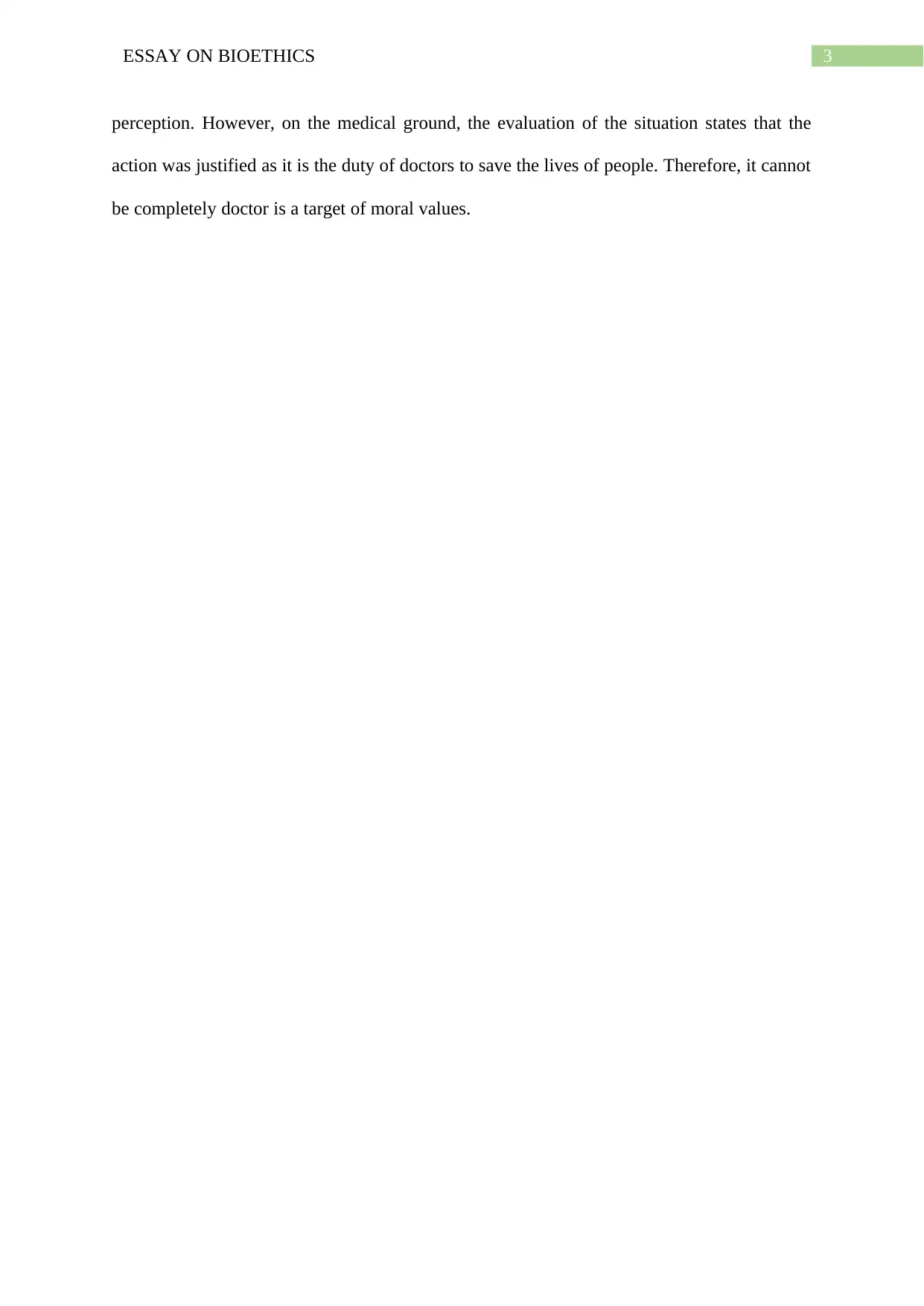
3ESSAY ON BIOETHICS
perception. However, on the medical ground, the evaluation of the situation states that the
action was justified as it is the duty of doctors to save the lives of people. Therefore, it cannot
be completely doctor is a target of moral values.
perception. However, on the medical ground, the evaluation of the situation states that the
action was justified as it is the duty of doctors to save the lives of people. Therefore, it cannot
be completely doctor is a target of moral values.
Paraphrase This Document
Need a fresh take? Get an instant paraphrase of this document with our AI Paraphraser
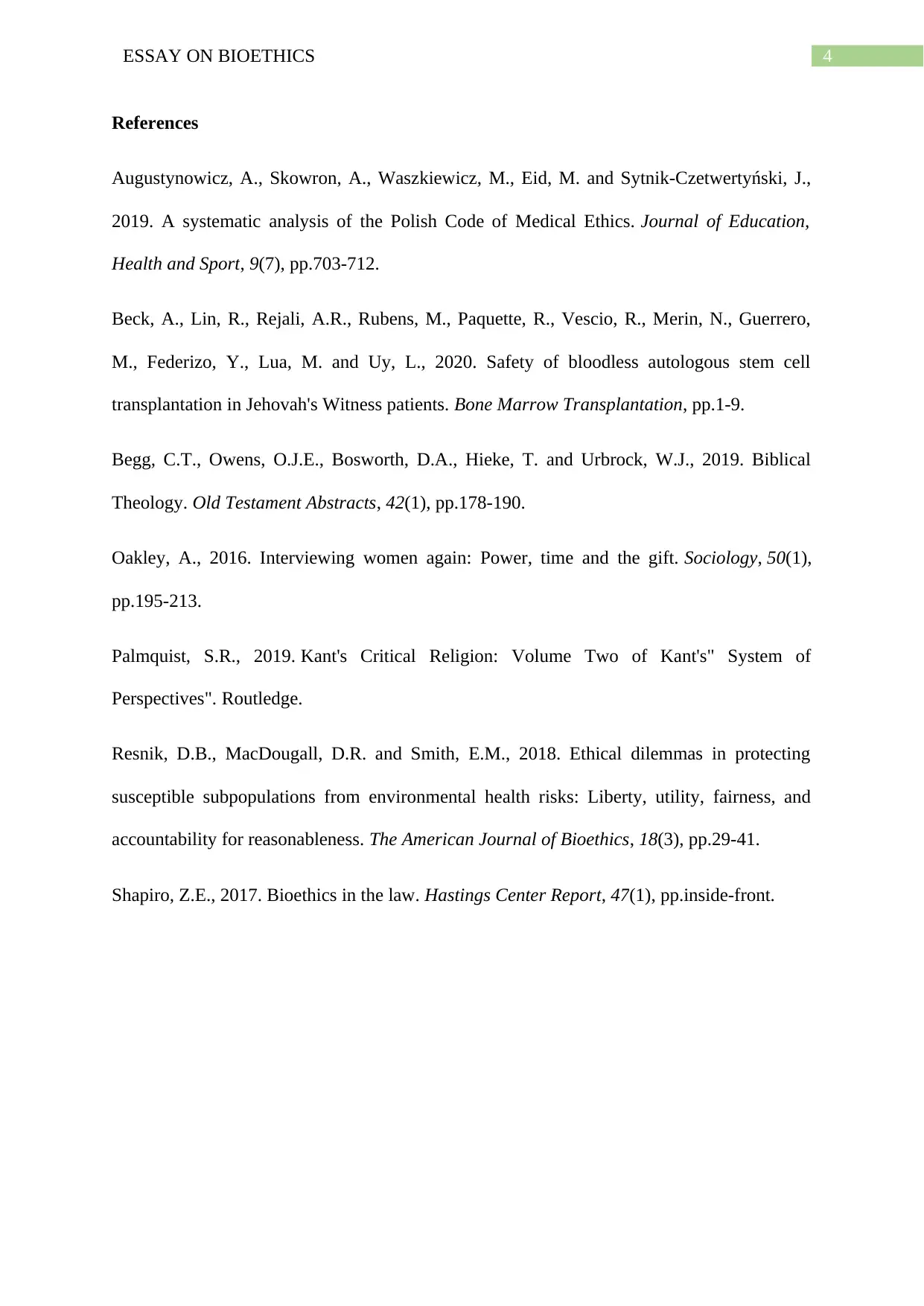
4ESSAY ON BIOETHICS
References
Augustynowicz, A., Skowron, A., Waszkiewicz, M., Eid, M. and Sytnik-Czetwertyński, J.,
2019. A systematic analysis of the Polish Code of Medical Ethics. Journal of Education,
Health and Sport, 9(7), pp.703-712.
Beck, A., Lin, R., Rejali, A.R., Rubens, M., Paquette, R., Vescio, R., Merin, N., Guerrero,
M., Federizo, Y., Lua, M. and Uy, L., 2020. Safety of bloodless autologous stem cell
transplantation in Jehovah's Witness patients. Bone Marrow Transplantation, pp.1-9.
Begg, C.T., Owens, O.J.E., Bosworth, D.A., Hieke, T. and Urbrock, W.J., 2019. Biblical
Theology. Old Testament Abstracts, 42(1), pp.178-190.
Oakley, A., 2016. Interviewing women again: Power, time and the gift. Sociology, 50(1),
pp.195-213.
Palmquist, S.R., 2019. Kant's Critical Religion: Volume Two of Kant's" System of
Perspectives". Routledge.
Resnik, D.B., MacDougall, D.R. and Smith, E.M., 2018. Ethical dilemmas in protecting
susceptible subpopulations from environmental health risks: Liberty, utility, fairness, and
accountability for reasonableness. The American Journal of Bioethics, 18(3), pp.29-41.
Shapiro, Z.E., 2017. Bioethics in the law. Hastings Center Report, 47(1), pp.inside-front.
References
Augustynowicz, A., Skowron, A., Waszkiewicz, M., Eid, M. and Sytnik-Czetwertyński, J.,
2019. A systematic analysis of the Polish Code of Medical Ethics. Journal of Education,
Health and Sport, 9(7), pp.703-712.
Beck, A., Lin, R., Rejali, A.R., Rubens, M., Paquette, R., Vescio, R., Merin, N., Guerrero,
M., Federizo, Y., Lua, M. and Uy, L., 2020. Safety of bloodless autologous stem cell
transplantation in Jehovah's Witness patients. Bone Marrow Transplantation, pp.1-9.
Begg, C.T., Owens, O.J.E., Bosworth, D.A., Hieke, T. and Urbrock, W.J., 2019. Biblical
Theology. Old Testament Abstracts, 42(1), pp.178-190.
Oakley, A., 2016. Interviewing women again: Power, time and the gift. Sociology, 50(1),
pp.195-213.
Palmquist, S.R., 2019. Kant's Critical Religion: Volume Two of Kant's" System of
Perspectives". Routledge.
Resnik, D.B., MacDougall, D.R. and Smith, E.M., 2018. Ethical dilemmas in protecting
susceptible subpopulations from environmental health risks: Liberty, utility, fairness, and
accountability for reasonableness. The American Journal of Bioethics, 18(3), pp.29-41.
Shapiro, Z.E., 2017. Bioethics in the law. Hastings Center Report, 47(1), pp.inside-front.
1 out of 5
Related Documents
Your All-in-One AI-Powered Toolkit for Academic Success.
+13062052269
info@desklib.com
Available 24*7 on WhatsApp / Email
![[object Object]](/_next/static/media/star-bottom.7253800d.svg)
Unlock your academic potential
Copyright © 2020–2026 A2Z Services. All Rights Reserved. Developed and managed by ZUCOL.





